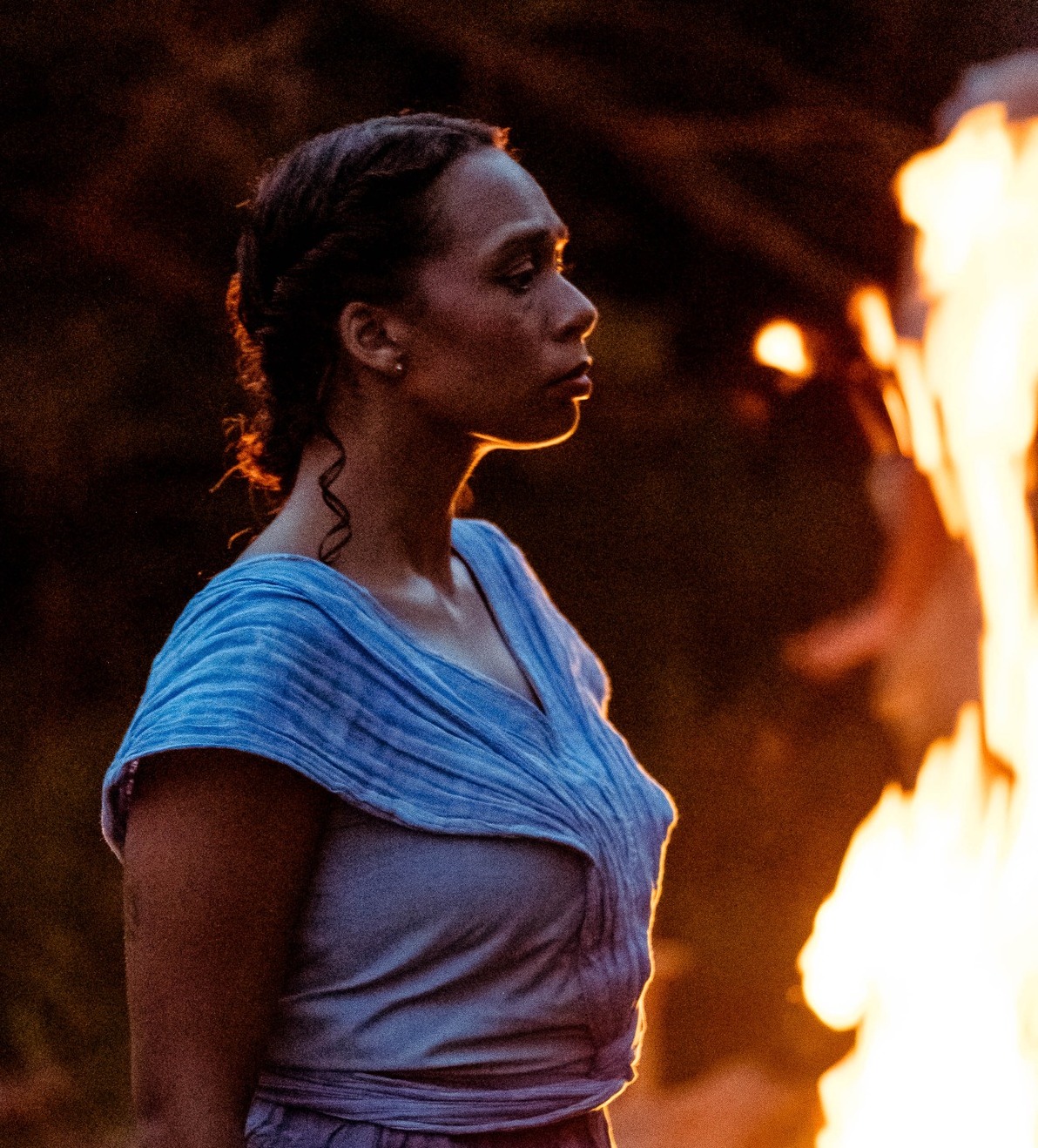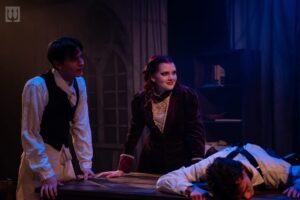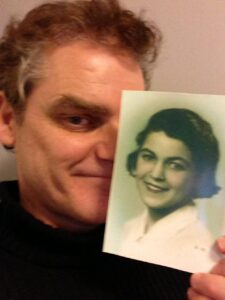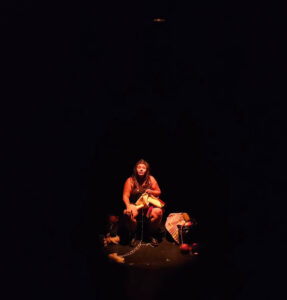
Kih Becke as Antigone. Photo by: Memo Calderon Photography
Sophocles wrote his play Antigone for the Festival of Dionysos in 441BC, and set the play in what was by then already Ancient Thebes, bringing to life a story about mythological characters that would have been very familiar to his audience, as part of the Mythology in which their society was firmly rooted. By all accounts this strange legend about the fallout from a family’s curse that led a son to accidentally murder his father, marry his mother, and have a number of children with her, two of which would end up killing one another on purpose in battle is very, very old, and in many, many, ways even more distant to us in Nova Scotia today than it was in Ancient Athens when Sophocles presented his play. Kate Besworth’s adaptation of the play, which plays around a fire at Ross Creek Centre for the Arts and closes tomorrow, makes the story feel as though it were written yesterday.
The story centres on a Princess, Antigone, played by Kih Becke, who is one of the daughters born to the unfortunate King Oedipus and his arguably even more unfortunate mother-wife Jocasta, played by Michelle Fisk. When Oedipus flees from Thebes in shame and horror, he leaves his kingdom to be shared equally amongst his two sons. Eteocles refuses to share with his brother, Polynices, which forces Polynices to attack Thebes as an invading army in attempt to reclaim his own title to the kingdom, and Eteocles and Polynices kill one another in the resulting war. Jocasta’s brother, Creon, becomes King, and decrees that Polynices’ body should be left where it fell and remain unburied, since he led an army against Thebes. No one may bury his body or mourn for him, under threat of death themselves. Antigone is adamant that she will bury her brother in accordance with their traditions, and dares her uncle to stop her. Creon fears that he will look weak and wishy-washy if he makes an exception for his niece, but is loathe to perpetuate the cycle of death and misery in his family.
One of the closest things we have to the Festival of Dionysos is New Orleans’ Mardi Gras and then Easter Sunday, this mixture of debauchery and the solemn ritualistic retelling of tragic stories rooted deeply in a communal tradition. I found myself thinking a lot about how for the Ancient Athenians the experience of going to a play like Antigone was very much an emotional journey, the idea of empathizing with the characters so much that at the end you would have a catharsis powerful enough to send you back into your life cleansed. It’s difficult for modern-day audiences to identify in the same way and to recreate this exact experience, but I realized that the feast I was having while watching Besworth’s play was more an intellectual one. And I think modern audiences do go to the theatre often hungry for an intellectual journey. Besworth has done a masterful job of backing both Antigone and Creon into their corners here, and weaving them in tangled webs of their own choices, and the choices that have been made by others beyond their control, and of course the wills of the Gods, so that the tragedy seems, even through a modern lens, inevitable.
Rosie Callaghan’s Ismene, Antigone’s sister, mirrors the audience’s perspective, I think, in that she begins the play with joyful naivety, certain that there must be a way for them to bury their brother, not get caught, and all live happily ever after. She has faith that both Creon and Antigone will find a compromise. Throughout the play Callaghan brings out Ismene’s shock and stupefaction at Antigone’s behaviour, her hurt, but also her love for her that endures to the end. Henricus Gielis plays the similarly naive Haimon, Creon’s son, who is also the person she is expected to eventually marry. Haimon loves and admires Antigone’s strength, and is also a very gentle young man, the glaring opposite of the abject violence swirling all around him. In the Greek myth Antigone is believed to be at most fifteen years old, and I got the sense from this play as well that Ismene and Haimon’s belief that everything was going to turn out alright was a reflection of their youth, while similarly Antigone’s rash and stubborn defiance was emblematic of hers. Kih Becke plays Antigone with such immoveable conviction that what she is doing for her brother is right. She is fierce to the point of being at times cruel to her sister and her uncle, her righteousness doesn’t always make her likeable, but her formidable strength, bravery and courage makes her exceptional. It is an awing performance that puts Antigone in league with every male hero in the canon. Michelle Fisk is absolutely heartbreaking as Jacosta, a broken woman and mother who really needs Antigone’s clarity to help her to see. Omar Alex Khan plays a beautifully nuanced Creon, a man who was never “supposed” to become King, and who is filled with doubts, and uncertainty whether he can convince the rest of the kingdom that he is worthy or even up for this daunting task. He has no idea how to connect with his sweet son, he seems useless in helping his emotionally ravaged sister, and now he holds the life of his firecracker niece in his hands. Chris O’Neill and Burgandy Code act as the Chorus of the Long Dead, who both help the story unfold clearly, and who give a sense of the larger community surrounding these five individuals: all of the history that has gone before them and that they are connected to, whether they like it or not.
The play comes to life around a campfire in the dark of night, surrounded by the natural world of Ross Creek Centre for the Arts. This feels so apt for a play that is about darkness, and grief, and where Antigone sneaks out literally in the cover of night to try to tend to her brother’s body. In a world like ours there is so much here that would be completely perplexing to Sophocles, let alone his Even-More-Ancient characters, but we all have the fire, we all have the trees, we all have the wide reaching night sky. There is also music that unites us, in a haunting Greek song, with music by Gielis with Callaghan and Khan, and lyrics from Sophocles. The play is directed by Ming Hudson in a way that plays so evocatively along with the firelight. We don’t always see the faces of the characters clearly, sometimes there are moments that happen in shadow, but when the actors are illuminated it is all carefully orchestrated.
I have always felt very alienated from Classical Mythology, I have struggled to find my way into seeing these stories as something eternal rather than some kind of theatrical archeology. Two Planks and a Passion Theatre has continually done me a great service in offering adaptations of these plays that I can easily connect with and enjoy without bemoaning the entire time that I probably should have gone to King’s. This Antigone is immediate and enthralling, and speaks as much to our world about power, family, patriarchy, and rebellion as the original did to the Athenians of its day.
There are fewer than ten tickets left for the last performance of Antigone, tomorrow August 19th, 2023 at 9:00pm at Ross Creek Centre for the Arts (555 Ross Creek Road, Canning, Nova Scotia). Tickets are available at this website.







1 thought on “Antigone Blazes Her Own Trail Fireside at Ross Creek”
Comments are closed.